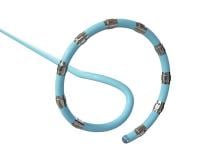Johnson & Johnson MedTech will enter the U.S. pulsed field ablation market following an FDA green light for its Varipulse platform for the treatment of atrial fibrillation.
The sector has seen massive growth this year following the agency’s approvals of respective systems from Medtronic and Boston Scientific. Pulsed field ablation aims to deliver similar success rates in treating the irregular heart rhythm that can raise a patient’s risk of stroke by specifically targeting certain cardiac cells and avoiding damage to nearby healthy tissues.
To set itself apart, J&J said it developed Varipulse to integrate seamlessly with its established Carto 3 heart-mapping system, which provides a 3D atlas of the heart’s anatomy and live electrical activity.
According to the company, this enables clinicians to pursue minimal to zero X-ray fluoroscopy during the procedure, with intracardiac ultrasound tools allowing patients and providers to avoid extra doses of imaging radiation. In addition, the system’s design offers a single transseptal access point to the heart’s inner chambers without the need to swap out and exchange catheters.
"We have learned in clinical trials and external evaluation in Europe, Japan and Canada, as well as with cases with competitive systems in the U.S, that with PFA technology, mapping integration is critically important for [electrophysiologists] to ‘see’ inside the heart and confidently deliver PF energy with precision," Jasmina Brooks, president of J&J's electrophysiology group, told Fierce Medtech.
"For example, 50% of competitive PFA cases in the U.S. are being mapped using Carto," added Brooks, who cited an installed base of more than 5,000 of the mapping systems.
"Careful catheter manipulation, accurate 3D visualization and navigation feedback continue to be important factors in procedural safety," she said. "Tissue proximity and location tagging are currently the best proxies for durable and contiguous lesion creation, which is a key focus for EPs using PFA today."

Varipulse picked up a CE mark in Europe and an approval in Japan at the top of this year. J&J has estimated that afib—the most common heart arrhythmia—affects more than 11 million people in Europe, at least 8 million in the U.S. and about 1.3 million in Japan, with about 1 in 4 adults over 40 at risk for the condition. The FDA’s approval covers Varipulse’s use in intermittent, or paroxysmal, afib that has not responded to drug therapies.
A single-arm clinical trial presented earlier this year at the International AF Symposium showed that, out of 186 treated patients, 75.6% of patients showed no signs of afib recurrence after one year as well as no evidence of other atrial arrhythmias such as tachycardia or flutter.
According to the company, that proportion increased to 80% when limiting consideration to participants that received “optimal” ablations. The trial also showed that procedures were able to be completed with less than eight minutes of fluoroscopy, and 98% of patients were able to have their pulmonary vein isolated on the first pass.
Next, J&J is developing a Thermocool Smarttouch catheter that can toggle between pulsed field and radiofrequency energy therapy, as well as the Omnypulse large-tip catheter for focal pulsed field ablation.
"The ability to deliver both RF and PF energy through one device offers the benefit of both energy modes," Brooks said. "This solution allows physicians to have control of their preferred energy source per anatomical segment and offers a point-by-point workflow that many of our customers prefer today... Varipulse is just our first entry into the PFA space."
Editor's note: This story has been updated with comments from J&J's Jasmina Brooks.